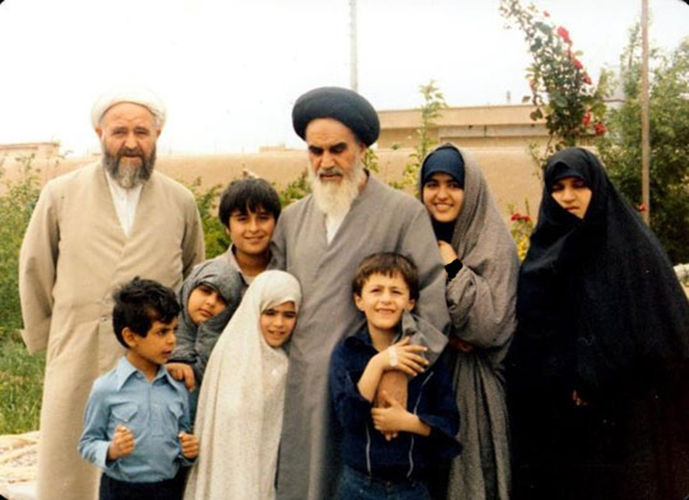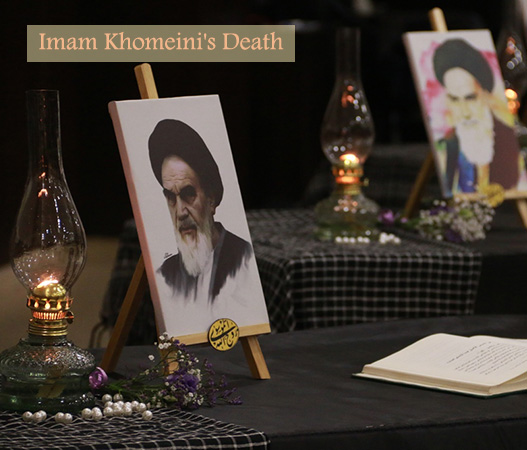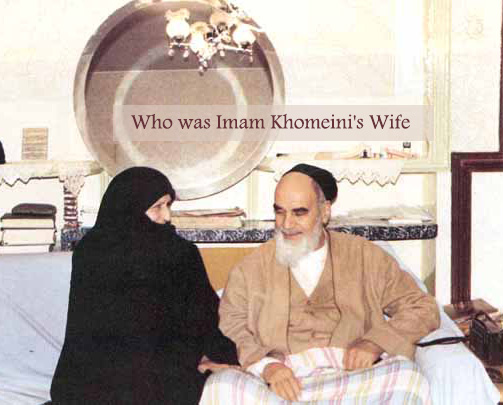Observance of the Rights of the Wife
The Imam always offered me the better place in the room. He would not
start eating until I came to the dinner table. He would also tell the children:
‘Wait until Khanom comes.’ He maintained respect for me and was not even willing
that I should work in the house. He would always tell me: ‘Don’t sweep.’ If I
wanted to wash the children’s clothes at the pond, he would come and say: “Get
up, you shouldn’t be washing.”
On the whole, I have to say that Imam did not consider sweeping, washing dishes
and even washing my children’s clothes as part of my responsibilities. If out of
necessity I sometimes did these, he would get upset considering them as a type
of unjust dealing towards me.
Even when I entered the room, he would never say: ‘Close the door behind you,’
but waited till I sat down and then would himself get up and shut the door.
The Imam’s Wife
60 Years of Living Together and not One Request for a Glass of Water
The Imam had extraordinary respect for his wife. For example, I am
not lying if I say that in the period of 60 years of living together, he did not
even reach for food (on the dinner table) before his wife, nor did he have even
the smallest expectation from her. I can even say that in the period of 60 years
of living together, at no time did he even ask for a glass of water, but would
always get it himself. If he was in such a position that he could not, he would
say: ‘Is the water not here?’ He would never say: ‘Get up and bring me water.’
He behaved this way not only with his wife but also with all of us who were his
daughters. If he ever wanted water we would all enthusiastically run to get it,
but he never wanted us to bring and give him a glass of water in his hand.
During the difficult last days of his life, each time he would open his eyes, if
he was capable of speaking, he would ask: ‘How is Khanom?’ We would reply: ‘She
is good. Shall we tell her to come to you?’ He would answer: ‘No, her back is
hurting. Let her rest.’
Siddiqa Mustafavi (Imam’s daughter)
Blessed I Am that I have Such a Wife
The Imam was very attached to his wife and had special respect for
her, so much so that he placed his wife on one side, and his children on the
other.
I remember that once, the Imam’s wife had gone on a journey, and the Imam was
missing her very much. When he would frown, we would jokingly say to him: ‘When
Khanom is here, Imam laughs, and when she is not here, the Imam is upset and
frowns.’
In short, however much we teased Imam, he would not stop frowning. Finally I
said: ‘Blessed is Khanom that you like her so much.’ He said: ‘Blessed am I that
I have such a wife. No one else has sacrificed as much in life as she has. If
you too would be like Khanom, your husband would also like you this much.’
Siddiqa Mustafavi (Imam’s daughter)
He Would Never Pass his Work to Anyone Else
As far as possible, Imam was particular that he should not impose his
work on others, but rather carry it out himself. In Najaf, it sometimes happened
that from the roof, the Imam would notice that the kitchen or bathroom light was
left on.
In these cases, he would not tell his wife or anybody else who was also on the
roof to go and switch off the light. Rather, he would himself make his way down
three flights of stairs in the darkness, switch off the light and return.
Occasionally, he would also want a pen or paper that was upstairs. In this
circumstance too, he would not tell anyone, not even his loved ones the children
of Martyr Marhum Hajj Sayyid Mustafa (Imam’s son), to bring them for him. He
would himself get up and go up the stairs to get what he needed and return.
Hujjatul Islam Sayyid Hamid Ruhani
Why is Hassan Disheveled Like This?
The Imam acted exactly according to all the instructions that he gave
from the start, and in actuality, was an embodiment of those very instructions.
He himself was the book ‘Forty Hadith’ that he had written in his youth. Suppose
he spoke about riya (performing any action for the purpose of other than the
pleasure of Allah) and reproached it, he himself would stay away from it with
intensity.
I remember one day my son entered the house wearing trousers which I had patched
up at one knee. Imam asked: “Why is Hassan disheveled like this?” I jokingly
replied: “It’s the life of poor people, Agha.”
Immediately, his face became drawn, and he said: “You don’t want to do riya.” I
said: “No, why riya?” He said: “Be careful. Not paying attention to outward
physical appearances has value. However, if you want to show (people) that I am
such and such, it is riya.”
Imam said this sentence to me with the same intensity with which he had, at the
age of 30 years, written in his book!
Fatema Tabatabai (Imam’s daughter-in-law)
I Have Come to Wash the Dishes
One day, as it so happened, there were many guests at the Imam’s
house. After the meal, I collected the dishes and took them to the kitchen.
Along with Zahra, the daughter of Agha Ishraqi, we prepared to wash the dishes.
However we saw that the Imam himself had immediately come to the kitchen.
I asked Zahra: “Why has Hajj Agha come to the kitchen?” I had a right to be
surprised because it wasn’t time to perform wudu. Imam rolled up his sleeves and
said: “Because there are many dishes today, I have come to help you.” My body
started to tremble. My Lord! What am I seeing! I said to Zahra: “I swear by you
to Allah, please request the Imam to leave. We will wash the dishes ourselves.”
This was really unexpected for me.
Marzieh Hadide Chi (Dabagh)
A Piece of Advice to Solve Family Issues
One of the Imam’s daughters narrates: “At the start of my marriage, I
went to Hajj Agha so that he could give me some advice. He said: “If your
husband is upset, or if he says something to you for whatever reason, or acts
badly, at that time don’t say anything, even if you are in the right. Leave it
until he has calmed down, and then say what you have to.” He also gave the exact
same advice to my husband.
In the beginning I didn’t give this advice much importance. Later upon
reflection, I saw that indeed the root of many of the family disputes came back
to this very issue. Therefore, from then on, every time somebody has wanted
advice about family issues, I have given them this very same advice of the Imam.
Hujjatul Islam Muhammad Hassan Murtadhavi Langarudi
Utmost Respect for Children
The Imam really liked young children. He had such an attachment to
them that he said:
“In Najaf, when we would return from the shrine, I used to like the children
very much despite their rough appearance.” The children would follow the Imam
until he reached home.
The Imam used to tell my daughter who used to complain about the mischievousness
of her child: “I am ready to exchange the reward that you get by bearing the
mischievousness of Husayn, with the reward of my worship.” He believed that
children should be free until they became older, and then limits should be set
for them.
On the subject of raising children, he used to say: “Be truthful with your
children so that they too are truthful. The role-models of children are their
fathers and mothers. If you behave correctly with your children, they will be
brought up correctly. Whatever you tell your children, act on that.”
Farida Mustafavi (Imam’s daughter)
*Derived from al-islam.org, Rays of the Sun


















